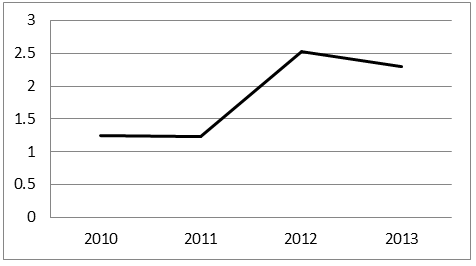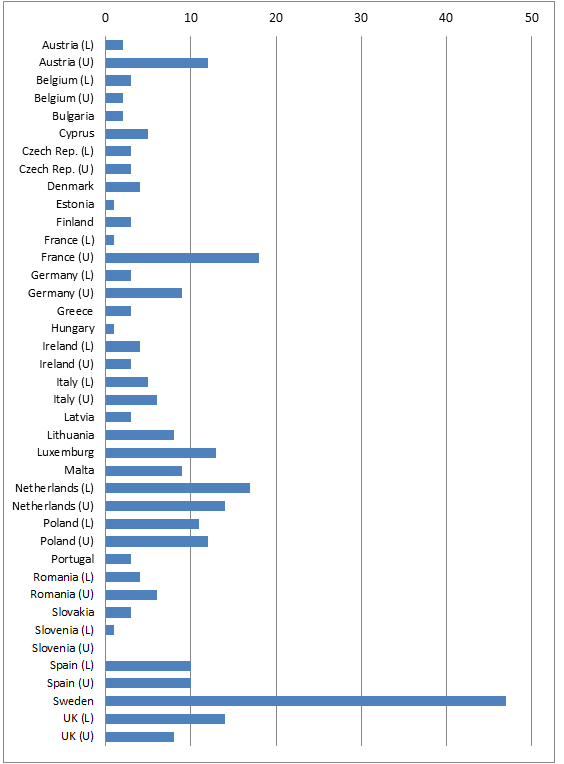Political motivation is crucial for parliamentary behaviour in the EU’s Early Warning System
Since the ratification of the Lisbon Treaty, national parliaments have had the right to intervene early on in the decision making process of European Union. Katjana Gatterman and Claudia Hefftler share research which shows that parliamentary activity in what is called the Early Warning System is particularly triggered by party political contestation over EU integration and is largely dependent on the salience and urgency of the draft legislation itself.
With the rising impact of European Union (EU) decision-making on European citizens’ daily life, the question of an adequate democratic order at Union level becomes ever more pressing. The most recent treaty changes introduced the ‘Early Warning System’ (EWS) in December 2009 providing national parliaments – for the first time – with the right to intervene in EU policy-making by submitting reasoned opinions on draft legislative acts as part of the subsidiarity procedure. However, the effectiveness of this instrument is viewed with scepticism by policy-makers and academics. Thus far, the threshold for a ‘yellow card’ by one third of national parliaments’ votes has been met only twice: in case of the Monti II regulation, which was then withdrawn, and the proposal to establish the European Public Prosecutor’s Office, which the European Commission maintained.
While these developments underline the rather limited impact on EU legislation, national parliaments nonetheless continue to submit reasoned opinions in the EWS: Between 1 January 2010 and 31 December 2013, they have raised their concerns by 286 reasoned opinions in response to an overall number of 411 draft legislative acts. We find this intriguing and therefore closely investigated individual parliamentary behaviour in the EWs.
For this, we designed a dataset which comprises the responses of individual parliamentary chambers to each draft legislative act. In the EWS reasoned opinions by unicameral parliaments count twice compared to submissions from individual upper or lower chambers in bicameral systems. Since we are interested in their motivation to submit a reasoned opinion and not the likelihood of reaching the threshold, we treat all reasoned opinions equally and count each as one submission per chamber.
We consider all 40 chambers in 27 EU countries (excluding Croatia). The maximum number of reasoned opinions to 411 draft legislative acts would have therefore been 16,440 if each chamber had submitted a reasoned opinion to each act. But there were only 286 reasoned opinions during our time period of investigation, which represents only 1.47 percent of all cases. Nevertheless we find a slight increase over time in the number of reasoned opinions relative to the number of legislative proposals between 2010 and 2012 (Figure 1).
Figure 1: Percentage of instances per year in which reasoned opinions were submitted
Note: The year is taken from the official document reference.
Moreover, we find considerable variation across parliamentary chambers. Figure 2 depicts the total number of reasoned opinions each chamber has submitted during the period of investigation. It shows that the Swedish Riksdag is by far the most active chamber in the EWS with 47 submissions in total; followed by the French Senate (18 reasoned opinions), the Dutch Tweede Kamer (17) and Eerste Kamer (14) as well as the British House of Commons (14). The remaining chambers have voiced their concerns over a draft legislative act at least once, with the exception of the Slovenian upper house.
Figure 2: Number of reasoned opinions per chamber during the time period of investigation
Notes: The time period of investigation lies between 1 January 2010 and 31 December 2013; the maximum number of reasoned opinions which could have possibly been submitted by a chamber is 411 in our data. ‘L’ stands for lower house and ‘U’ for upper house, i.e. the second chamber in bicameral systems.
What explains this variation? To answer this question, we applied logistic regression for rare events data (King and Zeng, 2001) due to the low number of reasoned opinions. Overall, we find that the political motivation of national parliaments rather than their sheer capacity plays a crucial role for the extent to which they become active in the EWS. In particular, we show that the more the EU is contested by political parties inside parliamentary chambers, the higher the incentives of their members (MPs) to raise their voice against legislative proposals of the European Commission. This also suggests that despite the predominant legal consideration of subsidiarity compliance, the EWS is politicised with respect to the pro-anti EU cleavage.
Party political contestation over the traditional left-right dimension also matters. However, we find a negative effect once we disregard the Swedish Riksdag, which has been most active. This finding implies that while policy influence as incentive to become active in the EWS is limited, policy preferences still tend to play a role. Left-right contestation supposedly constrains agreement over the delegation of competences to the EU and hence leads to lower engagement in the EWS.
Furthermore, salient and urgent draft legislative acts incentivise national parliaments to submit reasoned opinions: we find that the probabilities to submit a reasoned opinion are higher for new legislation and when it is voted upon by the EP plenary before the end of the scrutiny period. Taken together, it is MPs’ incentives and awareness which encourage pro-active scrutiny in the EWS. We also show that institutional capacity in terms of resources, inter-parliamentary exchange via the Conference of Parliamentary Committees for Union Affairs of Parliaments of the European Union (COSAC) and formal scrutiny rights, has only limited explanatory power for the likelihood of the submission of reasoned opinions.
The EWS has only been in force for a few years since the Lisbon Treaty was enacted in December 2009. Furthermore, our time period of investigation coincides with the Eurozone crisis. Our findings must therefore be interpreted with some caution regarding their representativeness for explaining variation in the participation in the EWS in the long run. Our analysis represents a first assessment. Despite the low frequency of reasoned opinions by national parliaments, we find that parliamentary activity in the EWS is particularly triggered by party political contestation over EU integration and is dependent on the salience and urgency of draft legislative acts themselves. Thereby national parliamentary chambers may be able to provide a political linkage between EU policy-making and their represented in the domestic context.
—
This post is a summary of Gattermann, K. & Hefftler, C. (2015). Beyond Institutional Capacity: Political Motivation and Parliamentary Behaviour in the Early Warning System. West European Politics, 38 (2), 305-334
Note: This article gives the views of the authors, and not the position of Democratic Audit UK, nor of the London School of Economics. Please read our comments policy before commenting.
—
 Katjana Gattermann is postdoctoral researcher at the Amsterdam Centre for Contemporary European Studies (ACCESS EUROPE) and based at the Amsterdam School of Communication Research (ASCoR). She is founding director of the Erasmus Academic Network on Parliamentary Democracy in Europe (PADEMIA) and co-editor of the LSE ‘Europe in Question’ Discussion Paper Series (LEQS).
Katjana Gattermann is postdoctoral researcher at the Amsterdam Centre for Contemporary European Studies (ACCESS EUROPE) and based at the Amsterdam School of Communication Research (ASCoR). She is founding director of the Erasmus Academic Network on Parliamentary Democracy in Europe (PADEMIA) and co-editor of the LSE ‘Europe in Question’ Discussion Paper Series (LEQS).
 Claudia Hefftler is PhD student and research associate at the Jean Monnet Chair at the University of Cologne where she was involved in the project Observatory of Parliaments after Lisbon (OPAL).
Claudia Hefftler is PhD student and research associate at the Jean Monnet Chair at the University of Cologne where she was involved in the project Observatory of Parliaments after Lisbon (OPAL).








 Democratic Audit's core funding is provided by the Joseph Rowntree Charitable Trust. Additional funding is provided by the London School of Economics.
Democratic Audit's core funding is provided by the Joseph Rowntree Charitable Trust. Additional funding is provided by the London School of Economics.
warum & wann nationale parliamente in #EU #frühwarnsystem nutzen: https://t.co/tWJcFf2GqC EU #Kritik durch Hintertür? @OeParl #nationalrat
Political motivation is crucial for parliamentary behaviour in the EU’s Early Warning System https://t.co/4L57wUCQfj
Political motivation is crucial for parliamentary behaviour in the EU’s Early Warning System https://t.co/qfW0SY62ys